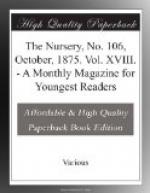He was certainly saying, “I do wish that sheep had a little more of the pig about him. If I am out of his sight for a moment, he begins to cry, and take on in such a manner, that I must show myself to him; and then I have all the trouble of making the sailors pump again.”
But the sailors only waited to make Dennis beg a little. They had no idea of not pumping again. They were always pleased when he showed so much good feeling for Billy; and generally he got a larger allowance of water to pay for it.
I believe that Dennis was not living when the ship reached California. That ever he became food for his sailor friends no one can imagine. Therefore his fate must remain a mystery, unless some of my readers happen to know one of the crew of “The Vanderbilt,” and can learn from him something on the subject.
If they can, there are many, no doubt, who would be glad to hear from them in the pages of “The Nursery.” My little girls would, at least. But, probably, Dennis has more of a place in their thoughts than he can have in those of others.
C.E.C.
[Illustration]
[Illustration]
THE UNMOTHERLY HEN.
Now, my dear children, if you will be very quiet, I will tell you a true story, which I sometimes tell my little daughter Fanny and her cousin Grace, when they climb up on my knees just before going to bed.
On a farm near Fishkill, where Fanny’s Aunt Jane lives, they raise a great many chickens, turkeys, ducks, and geese. When I was a boy, ever so many years ago, I used to have great fun hunting for eggs through the hay and straw in the barns.
Well, last year one of the hens, instead of laying her eggs in the hen-house or barn, like a well-mannered hen, stole off under a wood-pile, and was not seen for three weeks, when she made her appearance with a fine brood of chickens. To keep her from straying away again, she was put into a coop. For several days, she was a good mother to her children; but, after a week or so, she began to act very strangely, and, when her children came near her, she would peck and abuse them.
Would you believe it, children? in one day, this unmotherly hen had pecked all but one of her chickens to death; and, when Aunt Jane found this poor chap, he had but one eye, and all the toes were gone from one foot; so that he had to stand on the other. At first, Aunt Jane thought it would be a mercy to kill the little fellow, and put him out of pain; but she finally determined that she would try to cure him.
So she took him into the kitchen, and made him quite comfortable in a box half filled with cotton-batting, and placed near the stove. She gave him cracked-corn to eat, and plenty of water to drink, and, after a while, he got so strong, that he hopped out of the box, and was just as jolly a chicken as he could be, with only one eye to see with, and only one foot and the stump of another to walk on.




